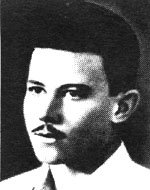Son of Esther and Moshe. Was born on February 10, 1922 in Tel Aviv, to a well-established family in Israel. Eliyahu was a member of the Irgun Zvai Leumi (National Military Organization) and was a member of the underground organization in 1937. When Lehi planned the assassination of Lord Moyne, the British Minister of State for Middle Eastern Affairs and his seat in Cairo, Eliyahu volunteered to join the mission. He had other positions in the Lehi organization and training, and spent many weeks in Cairo with his partner in action, Eliyahu Hakim. On 6.11.1944, the two assassinated and killed him. They began to retreat and almost succeeded, but Eliyahu Beit-Zuri was wounded in the ribs by the bullets that followed them. His friend rushed to his aid, and so both of them were caught. Eliyahu was hospitalized for two weeks, the bullet was removed from his body, and in January 1945 the trial of the two was opened in Cairo. At the center of the court hearings was the speech of Eliyahu Beit-Zuri, who made a strong impression. He began to speak in Hebrew, he said a few words in Arabic and then switched to fluent English. Unlike other fighters who fell into the hands of the British in Palestine, Eliyahu’s friends and family could not extend aid to him from abroad, and Eliyahu prepared his defense without outside assistance, except for the Egyptian defense lawyers that the court had given him. He spoke of the British regime that oppressed the Jewish people in its homeland, instead of fulfilling the mission imposed on it by the League of Nations, imposing a regime of injustice and tyranny in Israel, and did not hesitate to send the refugees to the Nazi inferno. He also accused the British of killing innocents and abusing those who fell into their hands. He protested against this tyranny and sought to bring the cry of the Jewish people to the world. To this end, he asked to be tried by an international court, but the Egyptian court rejected his request. On January 18, 1945, the court sentenced the death penalty to two in severe pressure from the British government. Eliyahu and Eliyahu accepted the ruling quietly. They were sure of their righteousness and were supported by students and youth in Egypt, who demonstrated sympathetic demonstrations and asked for amnesty for two. They also sought pardon for them all over the world, including famous writer Sigrid Undset, Nobel Prize winner, Italian conductor Arturo Toscanini, and more. They themselves did not ask for amnesty for their lives. In a letter that Eliyahu wrote to his father and his family from prison, he apologized to his father for the great sorrow he caused him in this act, but explained his motives and added that he could not have acted differently. In the prison, in the shadow of the gallows, the two friends were separated from each other. At the same time, Eliyahu Beit-Tzuri’s twenty-third birthday took place. On March 21, 1945, the families visited the two young men and Eliyahu came to his two sisters (his father, who was a heart patient, could not stand it). He was interested in what was going on in Israel, in his family and friends, and kept his cool, even though he understood that he was standing in the shadow of the gallows. On the following day, on March 22, 1945, at 6:30 am, the deputy chief rabbi of Egypt informed the two convicted men that an hour and a half later the sentence would go into effect. One hour later, Eliyahu Hakim, who was standing in front of the gallows, thanked the Egyptian prison authorities for their kindness to him and his friend from their imprisonment until the day. He also wished to convey his thanks to their defense attorneys, who fulfilled their duties faithfully and devotedly, and went to the scaffold in the song “Hatikvah.” He was buried in the Jewish cemetery in Cairo. On the seventeenth of Tammuz 5735 (06/26/1975) the remains of Eliyahu Hakim and Eliyahu Bet-Zuri were sent to Israel and buried in a military ceremony at Mount Herzl in Jerusalem.
